 I wrote this review of Conan the Barbarian (2011) on September 3, 2011 immediately after seeing the movie. I put it up at the old Conan forum which is now gone. I have been meaning to run this for some time and thought why not now? So, let us travel back to 2011:
I wrote this review of Conan the Barbarian (2011) on September 3, 2011 immediately after seeing the movie. I put it up at the old Conan forum which is now gone. I have been meaning to run this for some time and thought why not now? So, let us travel back to 2011:
I caught Conan the Barbarian today. I am on vacation and had planned on seeing it. I was thinking of blowing it off, but it got to 91 degrees today with a dew point of 72 degrees. That converts to it being steam and I wasn’t going to do an eight-mile bike ride the way I planned.
Take home impression: This is a SyFy Channel movie with a big budget. Very influenced by the Pirates of the Caribbean movies. Read More
Science Fiction and Fantasy New Releases: 21 November, 2020
Saturday , 21, November 2020 Uncategorized Leave a commentSecretive space haulers, infernal summoners, and desperate alchemists adorn this week’s list of new releases.
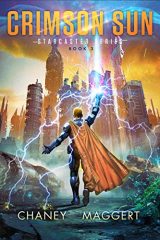 Crimson Sun (Starcaster #3) – J. N. Chaney and Terry Maggert
Crimson Sun (Starcaster #3) – J. N. Chaney and Terry Maggert
The Nyctus don’t like losing, and they’ll go to any lengths to turn the tides of war.
When the idyllic planet Nebo is scorched into oblivion, it’s obvious that the Nyctus are moving massive fleets into human space again, and their intention is clear: even if they lose their ships, they will render planets into ash.
To add to the damage, they seem to have key intelligence that could only have been obtained by a human crew.
Only one ship has ever gone missing, it’s disappearance unexplained and its crew never to be found: The Pool of Stars, one of the first starships.
And she’s been missing for centuries.
Now, after all these years, it’s up to Thorn to find it, for her disappearance might hold the key to victory.
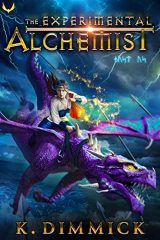 The Experimental Alchemist – K. Dimmick
The Experimental Alchemist – K. Dimmick
Born to die in the game. One chance to solve the riddle that’ll save her life…
Orianna, born a slave who could be sacrificed into a deadly virtual world at any moment, still dares to dream of a better life. But when she’s finally uploaded into a land of magic and monsters, she has six days to solve an impossible riddle before nanotech destroys her body from within.
Lagging far behind her fellow adventurers, Orianna joins the domineering Dragon Hunter’s Guild in an effort to survive. But when she realizes the guild leader will do anything in his bid for power, she’s faced with sacrificing an innocent to save herself. Her risky plan to use magic and pass through the Dragon Gate will either save her or wipe her from existence.
Will Orianna solve the riddle in time to prevent her from dying for good?
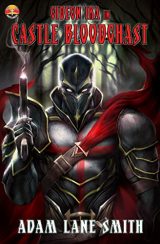 Gideon Ira in Castle Bloodghast (Deus Vult Wastelanders #4) – Adam Lane Smith
Gideon Ira in Castle Bloodghast (Deus Vult Wastelanders #4) – Adam Lane Smith
You can feel Castle Bloodghast seething around you.
This ancient castle is the grave of many a hero. When a fearful angel appears to him in a vision, Gideon is charged to enter the cursed fortress in search of his childhood friend. But demons are the least of the denizens lurking in the heart of the castle. Gideon must battle the fruits of the most depraved genius as he struggles to reach his old comrade.
Abominations lurk in every shadow, and the worst atrocities are those committed by bloody human hands. Will Gideon put the corrupted experiments to the torch as they rampage out of control? Will he find a way to escape the curse and free his friend? Or will he break under the unrelenting horror at the heart of the fortress?
Enter Castle Bloodghast, where even angels fear to tread.
 Hell and High Water (Summoner For Hire #2) – Domino Finn
Hell and High Water (Summoner For Hire #2) – Domino Finn
You think your boss is a hard-ass… Mine’s from the pits of Hell.
My name’s Shyla Crowe and I’m a procurement specialist. That’s a fancy way of saying I steal things. I’m also a demon summoner, and… well… there’s nothing fancy about that.
You need to watch yourself around hellions. Case in point: I’m currently paying for my father’s sins. The Angel of the Abyss has me firmly under his thumb, profiting from my dishonest work. Millions of dollars and score after score aren’t enough to sate his ambition.
Now his eyes are on a new prize, and pulling off the heist will take the combined efforts of my team and then some… In from the cold walks Cisco Suarez, a necromancer with an ax to grind. As if my troubles aren’t bad enough, he thinks I owe him.
I’m a practical gal so the plan’s simple. Keep the boys from butting heads and hope neither of them gets me killed… or worse. Hell is, after all, notorious for inspired punishment. Read More
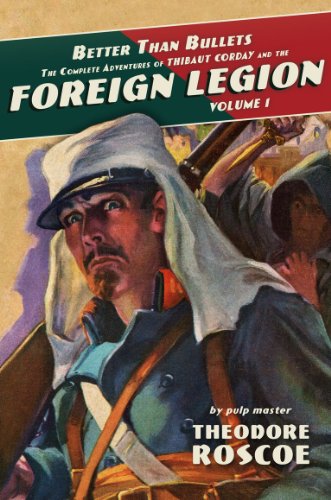 “It is a wild, savage, bitter story, I repeat, for no story of the Legion deals with life in a Boston drawing-room. Quaintly enough, this story has to do with a glass eye. And a live eye, too. You know that grim saying from the Bible: ‘An eye for an eye’? But yes. This is the story of an eye for an eye. And a grim little story it is.” – Thibault Corday
“It is a wild, savage, bitter story, I repeat, for no story of the Legion deals with life in a Boston drawing-room. Quaintly enough, this story has to do with a glass eye. And a live eye, too. You know that grim saying from the Bible: ‘An eye for an eye’? But yes. This is the story of an eye for an eye. And a grim little story it is.” – Thibault Corday
In “An Eye for an Eye”, by Theodore Roscoe, we return once more to the French Foreign Legion and the soldiers’ tales of Thibault Corday, the cinnamon-bearded retired legionnaire holding court in the cafes of Algiers. But where his introductory tale, “Better than Bullets”, was one of the humorous and sanitized tales every veteran keeps for the children, “An Eye for an Eye” is a far darker tale of betrayal and wrath. Corday spins this tale to vex a particular loathsome American, who boasts of a fortune made from glass eyes. And, as always, great troubles come from the smallest of provocations:
“When two boys love the same girl there is apt to be plenty of trouble. Especially if they already hate each other, as with the case with those two young cadets at St. Cyr.”
Corday recalls, as though from the front row of the audience, the crossing of swords between two cousins, Hyacinth and a promising cadet nicknamed Carrot (for his red hair). Jealousy provoked Hyacinth to strike at Carrot, and a beautiful and vain girl was just the excuse. The scoundrel left Carrot on the dueling field, leaving the once-promising cadet without an eye and with only the wrathful oath of taking an eye for an eye as company. Carrot would spend two decades training for and hunting down Hyacinth, with the cousins’ paths finally crossing in Dahomey, a dark and haunted land perfect for settling wrathful deeds.
In Corday, Roscoe captures perfectly the voice of a veteran and a veteran storyteller. Corday is a master entertainer, able to keep rapt audiences at the café–and those reading–with nothing but the spoken word. Word choice, rhythm, cadence–all the tricks of a master orator, captured neatly on the page. You can almost hear the old soldier’s laughter in each paragraph. It has been a vexing temptation to quote more from the old soldier than I already have. And it is my hope to one day find these stories matched in audiobook to the proper performer to give Corday’s words the life they deserve. Say, what is John Ringo up to, these days?
But what stands out the most in this tale of revenge is that Roscoe has created a naturalistic weird tale, full of exotica, dread, and uncanny occurrence. He just provides a convincing natural explanation for the events. Corday is known to embellish his stories–as is common for a tableside war story–he just never stretches credulity by bringing in the supernatural. The normal passions of men are dark and mysterious enough to provide the backdrop to this cautionary tale. Even the twist at the end, where we find out just how close the cinnamon-bearded veteran was to the clashes between dour Hyacinth and fiery Carrot, falls perfectly into the traditions of the Weird. And it is in this vein that many of Corday’s later tales follow.
The world might be plenty strange enough for Corday, but his tales are some of the most approachable of the adventure pulps, even now, where desert sands invoke Black Hawk Down instead of Lawerence of Arabia. Expect to see more about the old legionnaire, soon.
Sensor Sweep: Providence, 4th Generation Warfare, Frank Belknap Long
Monday , 16, November 2020 Sensor Sweep 6 CommentsJames Bond (Arkhaven Comics): Daniel Craig is the only man on Earth who  doesn’t want to be James Bond. For the past three movies every time his James Bond comes on screen you see a guy who seems to feel like an old man who has failed at all of his dreams in life and is secretly hoping that this will be the mission where he ducks too slow. And then somebody else will be handed off this cover ID that has been bouncing around MI-6 since Hitler was Britain’s biggest worry.
doesn’t want to be James Bond. For the past three movies every time his James Bond comes on screen you see a guy who seems to feel like an old man who has failed at all of his dreams in life and is secretly hoping that this will be the mission where he ducks too slow. And then somebody else will be handed off this cover ID that has been bouncing around MI-6 since Hitler was Britain’s biggest worry.
Military Science (Marzaat): In one sense, Fourth Generation Warfare is not 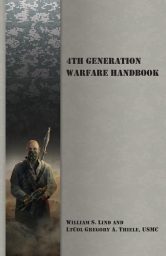 something new. It’s a return to how warfare used to be fought before the Peace of Westphalia in 1648. It is not war between nation states but between “clans, tribes, ethnic groups, cultures, religions and gangs”. But it is fought in a modern context with electronic distribution of propaganda being important.
something new. It’s a return to how warfare used to be fought before the Peace of Westphalia in 1648. It is not war between nation states but between “clans, tribes, ethnic groups, cultures, religions and gangs”. But it is fought in a modern context with electronic distribution of propaganda being important.
Fiction (Goodman Games): The English writer William Hope Hodgson (15 November 1877 – 19 April 1918) is an author whose influence on those that came after him greatly exceeds his current  renown among readers. This despite being hailed as one of the originators of Cosmic Horror, the sub-genre of horror fiction most readily associated with H.P. Lovecraft, and The Dying Earth tradition of science fantasy as later typified by Jack Vance, as well as producing two acknowledged classics of Weird Fiction, The Night Land and The House on the Borderland.
renown among readers. This despite being hailed as one of the originators of Cosmic Horror, the sub-genre of horror fiction most readily associated with H.P. Lovecraft, and The Dying Earth tradition of science fantasy as later typified by Jack Vance, as well as producing two acknowledged classics of Weird Fiction, The Night Land and The House on the Borderland.
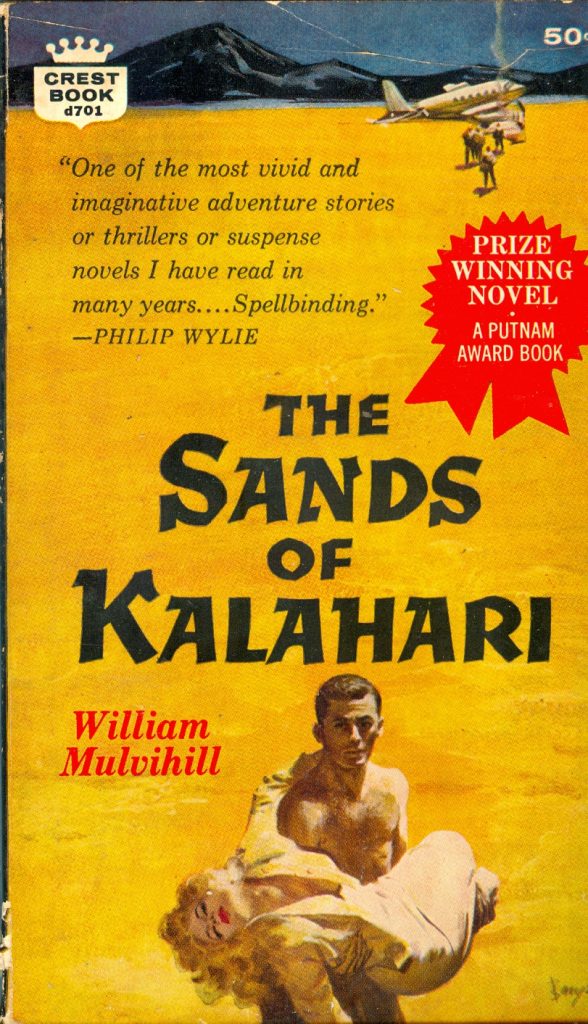
The survival novel is a subtype of the adventure story. The whole man vs. environment thing drilled into you in 9th grade English class. William Mulvihill’s The Sands of Kalahari was originally published in 1960 winning a Putnam Award. Mulvihill (1923-2004) had around ten novels from the late 1950s to the 1990s.
You may have seen the movie Sands of the Kalahari from 1965 starring Stuart Whitman. The novel is rather close to the movie with a few minor changes.
Seven passengers take a plane from Angola to South West Africa. The plane crashes in the Namib Desert. A problem is the flight by a small-time operator and the flight not registered. No one knows the plane is missing. The novel starts with the passengers burying one who was critically injured in the crash. Read More
Rabble in Arms: To the Shores of Lake Champlain
Saturday , 14, November 2020 Uncategorized 1 Comment “In the beginning I must say that this is no book for those who swear by old wives’ fables, holding all Americans brave, all Englishmen honorable and all Frenchmen gallant. It cannot please such innocents as are convinced that men in public office always set the nation’s welfare above their own, not those who think all soldiers patriots. It will disappoint the credulous who cherish the delusion that patriotism burns high in every breast in the hour of a country’s peril.” – Captain Peter Merrill, Rabble in Arms, by Kenneth Roberts
“In the beginning I must say that this is no book for those who swear by old wives’ fables, holding all Americans brave, all Englishmen honorable and all Frenchmen gallant. It cannot please such innocents as are convinced that men in public office always set the nation’s welfare above their own, not those who think all soldiers patriots. It will disappoint the credulous who cherish the delusion that patriotism burns high in every breast in the hour of a country’s peril.” – Captain Peter Merrill, Rabble in Arms, by Kenneth Roberts
Such words in the present day and the present hour, where war profiteers line up to sway elections, would normally serve to lessen the acts of the brave in defense of their country by ascribing venal motives to the sacrifices made. Kenneth Roberts instead heightens the bravery of the fighting soldier by contrasting him against the three curses of the American people: her war profiteering merchants, her political generals, and Congress. The complaints about chiseling merchants who would prefer lining their pockets with fifty years of war instead of swift victory resound in a time where the Cold War gave way to the War on Drugs and finally to the War on Terror. Roberts sets the privations and toils suffered by the fighting man against the pride and blundering of the politicians, merchants, and generals, and describes how easily the latter can waste the former. For the want of supplies, the invasion of Quebec failed. And despite the same lack, Benedict Arnold delayed the British just long enough to keep them from seizing New York in the winter of 1776.
But such a story needs a human face, to strive and suffer, to worry and overcome. We find ours in Britain, as the brother Peter and Nathaniel Merrill rush to return to Maine as war with the colonies breaks out. Nathaniel is quite smitten with a fellow passenger, Marie de Sabrevois, whom Peter soon suspects of being a British spy. Upon their return, and finding their family suffering for Nathaniel’s presumed Loyalist sentiments, both brothers sign up for a special scouting company attached to Benedict Arnold’s troops. Led by their townsmen Steve Nason and Saved from Captivity Huff, the scouts must venture northward to find General Arnold and deliver vital news. General Burgoyne is set to arrive in Canada with British regulars and Hessian mercenaries and invade the northern colonies.
General Arnold proves to be a capable and charismatic fighter, who soon finds work for the Merrills in creating a fleet of galleys and gunboats to delay the British at Lake Champlain. As the Americans and British build up their fleets, Peter finds himself in a strange net of intrigue between Marie, Nathaniel, and Marie’s niece Ellen. Ellen and Peter prove to be quite fond of each other, but the spy mistress Marie uses their feelings to drive a wedge between Nathaniel and Peter and even Peter and Ellen. Finally, the arms race is over, and the makeshift fleets clash on the waters at the Battle of Valcour Island, where we will pause with Nathaniel, Cap Huff, and Steve Nason wounded and most of the American fleet burning.
Roberts does a masterful job mixing in the harrowing cost of battle with the herculean feats needed to fight in one. Unlike many authors who criticize the sanitary and jingoistic portrayals of war, he does not denigrate the bravery shown by the soldiers. However, Roberts also does not shy away from the costs in sweat, blood, shivers, and disease of war. Rabble in Arms just does not have the fascination with pain and gore that more contemporary writers seek to shock readers with. And while Roberts is truthful about the costs, his depictions never seek to extinguish the other truth about war–that it can be an adventure, too.
Roberts occasionally gets taken to task for his portrayals of the various peoples in Rabble in Arms. For what, I’m not sure. He does an excellent job portraying each as sometimes better, sometimes worse, and mostly just different than the rest. The clash of custom becomes an amusing aside as Peter and Ellen slowly orbit each other, frustrated by the mix of American, Canadian, and Indian customs they find around them. Roberts instead pokes fun at the various superstitions each people have about the others, whether it is American and Indian, British and American, or even the various American states and each other. The real ire is aimed at the venal and well-connected in each group.
As of now, the war drums are beating a path towards Saratoga, with Marie still on the loose and the genius that makes Arnold’s immanent betrayal a still fresh wound in the American psyche yet to be revealed. Will Peter and Nathaniel, Steve and Cap return to their homes in Arundel or find themselves captive in a British prison? We will find out in the second half of Rabble in Arms.
Science Fiction and Fantasy New Releases: 14 November, 2020
Saturday , 14, November 2020 Uncategorized Leave a commentExtra-solar colonies, time traveling cops, and man-eating sasquatches haunt this week’s new releases.
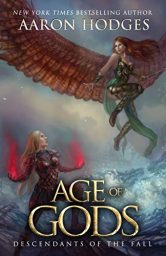 Age of Gods (Descendants of the Fall #3) – Aaron Hodges
Age of Gods (Descendants of the Fall #3) – Aaron Hodges
Pursued by the inhuman Tangata, Lukys flees on foot through the wilderness. He and his companions make for the ocean, a stolen ship their only hope—but even that may prove fleeting. For should they reach the island of Perfugia, a war is brewing between the kingdoms of humanity. Lukys fears he will find only more death on the shores of their homeland. But they have nowhere else left to go.
Meanwhile, the Queen’s Archivist might hold the key to peace. Standing before the City of the Gods, Erika has dreamed of this moment her entire life—so why does she feel such dread? The City is nothing like she imagined, plain stone buildings in place of soaring towers. And the Gods have sworn against interference in the struggles of lesser beings. She must make them see the truth, convince them to abandon their ancient laws, or humanity will fall. And the Tangata will rule, ascendant.
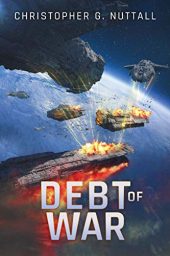 Debt of War (The Embers of War #3) – Christopher G. Nuttall
Debt of War (The Embers of War #3) – Christopher G. Nuttall
The Commonwealth Civil War has stalemated, but both sides—desperate to win at all costs—are looking for ways to end the fighting before everything they’ve built is turned to ash. King Hadrian, on the edge of madness, searches for allies who might help, at a price. His enemies, all too aware the battle is far from won, search for long-forgotten truths that might tear the king’s forces apart and end the war in a single blow. For Admiral Kat Falcone and Commodore William McElney, caught on opposite sides, everything they’ve ever loved is at stake.
William knows a secret, a secret that may end the war if he and his friend Kat can work together long enough to use it. But powerful forces are arrayed against them, intent on fighting the war to the bitter end. One false move and they’ll both fall into fire…
…And hundreds of planets will burn with them.
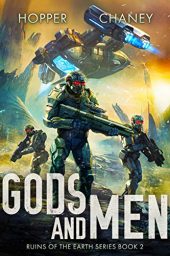 Gods and Men (Ruins of the Earth #2) – Christopher Hopper and J. N. Chaney
Gods and Men (Ruins of the Earth #2) – Christopher Hopper and J. N. Chaney
Humans are herded like sheep for the slaughter.
And their only hope for survival lies with a team who just left the planet.
Following their successful mission to destroy the slaver ring in New York City, Wic and the members of Phantom Team pass through the Antarctic’s origin ring and find themselves deep in the heart of the Androchidan Empire.
But as the scope of the alien specie’s operation becomes apparent, Phantom Team realizes they can’t standby as humanity is culled into submission. Efforts must be made to slow the enemy’s progress, if not stop it altogether.
Under Wic’s leadership, the team devises a plan to infiltrate and neutralize part of the Androchidan’s operation. Allies are made, and resources are acquired. But when enemy spies find evidence of collusion, it is only a matter for time before the Phantoms’ hopes of thwarting the enemy are dashed.
Will Wic and his elite team of warriors succeed in reversing the tide of the Androchidan invasion? Or will they succumb to the unrelenting power of the most notorious slaver operation in the galaxy?
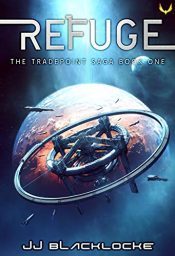 Refuge (Tradepoint Saga #1) – J. J. Blacklocke
Refuge (Tradepoint Saga #1) – J. J. Blacklocke
A Dangerous Haven. Adapt or die.
Nine hundred Vennans undertake a cultural exchange to Tradepoint, a space station where aliens from different worlds meet to do business. A young and gyfted Speaker, Gredin, is translator and diplomat for the happy occasion.
But a horrific vision shatters her first night’s sleep on Tradepoint. Venna, their homeworld, has been destroyed. Now the safety of the delegation, the only Vennans left in all of time and space, rests on Gredin’s young shoulders.
Stunned and grieving, she navigates trade wars and political prejudice, bartering with other races—some friendly, some neutral, some outright hostile—for what her people need to survive. And the cost of failure is the unthinkable.
Extinction. Read More
These days the standard approach to analyzing of E.C. Tubb’s classic sci-fi series of adventure novels involves a heavy grounding in the classic sci-fi tabletop RPG, Traveller. Alas, younger me had not read the source material, and so my imagination lacked the fertile compost of this series in which a game of Traveller might have taken root. As such, investigating the ties that bind novel to game is an exercise best left to other analysts. Instead, reading these novels at this late stage of the game of life, the best I can do is report of them from a purely literary angle.
And from that angle, they are pretty damn good.
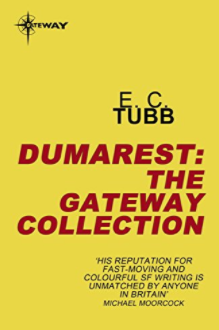
The series starts off with The Winds of Gath in which the titular hero, Earl Dumarest, yanked out of cold sleep by a bored ship’s tech. It’s the cliched approach to introducing a universe, one in which the character must warm up to his new situation in parallel with the reader.
It’s also an excellent way to establish two very important points right from the very first page. First, that the universe is a cold and uncaring place filled with cold and uncaring people who are happy to cheat you out of your last nickel for nothing more than their own amusement. It’s also a great way to establish the primary means of interstellar travel – a cold sleep that turns our primary protagonist from hot blooded hero to ice-cubed dunnage every time he planet-hops. It demonstrates that planet-hopping is a serious endeavor fraught with risk and expensive in terms of time and money. These two important points drive most of the action of the early stories in the series.
Read MoreSensor Sweep: Fright Night, L. Sprague de Camp, Space Viking
Monday , 9, November 2020 Sensor Sweep 4 CommentsCinema (Taste of Cinema): The experimentation and comparable restraint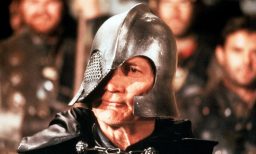 of the American New Wave had crested and crashed, flooding 80s cinema with cheap excess. What had been operatic overload with a point in Siegel, Kubrick and Lucas was now stagnant, murky in its message and rubbish strewn. Nothing demonstrated this better than the decade’s dubious love affair with Fantasy cinema. While post-millennium interest in the genre course-corrected with devout attempts to do Fantasy justice by staying true to text (as in the case of Tolkien-by-way-of-Jackson or even Thrones), 80s Fantasy cinema just soaked up the stinking floodwaters.
of the American New Wave had crested and crashed, flooding 80s cinema with cheap excess. What had been operatic overload with a point in Siegel, Kubrick and Lucas was now stagnant, murky in its message and rubbish strewn. Nothing demonstrated this better than the decade’s dubious love affair with Fantasy cinema. While post-millennium interest in the genre course-corrected with devout attempts to do Fantasy justice by staying true to text (as in the case of Tolkien-by-way-of-Jackson or even Thrones), 80s Fantasy cinema just soaked up the stinking floodwaters.
Ian Fleming (Unz.com): The late Sean Connery was a great movie star, but was he ideally cast as James Bond? The question that always ran through my mind watching Connery as Bond was “Why is this magnificent Scottish prole playing the quintessential English gentleman?” Especially because there are so many other actors who could play the English gentleman? These days, British actors tend to come from upscale backgrounds, but back in the time of Connery, Caine, O’Toole and the like, they were more working class.
Writing (Kairos): Hang out around science fiction authors long enough, and you get the sense that they’re all crazy. John Scalzi claims that Donald Trump and the weather conspired to give him writer’s block. Patrick Rothfuss and George R. R. Martin have cited similarly temperamental reasons for not finishing their popular series. The ancient Romans had a saying, Ars longa, vita brevis. Moderns take it to mean that life is short, but works of art last. Read More
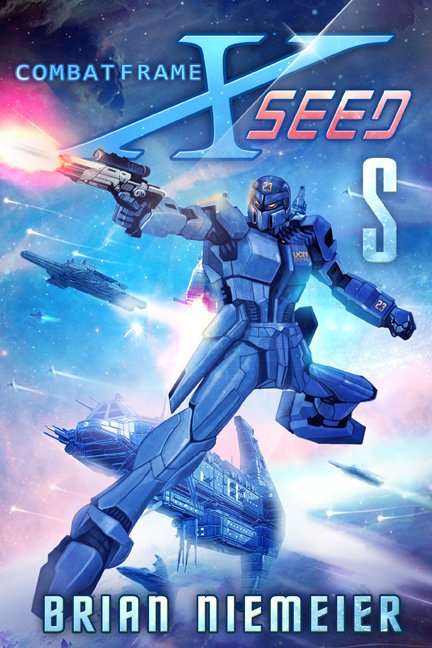 Nearly 60 years after Arthur Wake’s rebellion encountered the vanguard of the Ynzu’s extermination fleet, humanity finds itself in the third decade of an alien siege. Mass-produced combat frames and far-flung extra-solar colonies have kept the wave of crystalline Yuzu reapers from sweeping humanity into the dustbin of history. But desperate times call for desperate measures, and none are more desperate than Project S.
Nearly 60 years after Arthur Wake’s rebellion encountered the vanguard of the Ynzu’s extermination fleet, humanity finds itself in the third decade of an alien siege. Mass-produced combat frames and far-flung extra-solar colonies have kept the wave of crystalline Yuzu reapers from sweeping humanity into the dustbin of history. But desperate times call for desperate measures, and none are more desperate than Project S.
When the Ynzu attack the colony world of Cassone, Dex Trapper and Thatcher Drummond commandeer a relic XSeed prototype to find help for the besieged colony. This fateful decision sparks a chain of events that thrust the duo into the heart of the machinations around Project S–as unwitting test subjects. Not only must they and their new-created XSeed squadron, the Guardian Angels, help free Cassone, they must track down their rogue Project S predecessors who are now working as infiltrators for the Ynzu.
Brian Niemeier’s Combat Frame XSeed: S kicks off the second XSeed trilogy with yet another shift in tone and context. Instead of playing a familiar theme and variation on rebellion, intrigue, and mecha combat that drive the secret history of the XSeed world, Brian Niemeier switches to more conventional set-piece battles and the frantic search for the hidden hands of history that might guide humanity to survival or extinction. With the change in stakes and scope comes a more relaxed pacing. Don’t get me wrong, XSeed: S provides plenty of harrowing mecha action. This time around, though, Dex and the reader are given time to think and breathe before the next twist and revelation.
XSeed: S is still a martial thriller, so those looking for the regimentation of milSF won’t find it here. After all, insubordination might be anathema to the military-minded, but it’s a right of passage for a mecha pilot. However, XSeed: S comes closest to the conventions of that genre, as the Guardian Angels get hemmed up repeatedly for acting on the independence expected of the mecha pilot. And the consequences are not the token pushback of desk jockeys either. The Rule of Cool still reigns, so the result is more Macross than United States Marines.
 While previous XSeed novels drew heavily from a Gundam lineage, XSeed: S wears its Macross heritage proudly. Many resonances to that second venerable mecha series exist, from rival aces, to wunderkind pilots discovered when stranded in space, to alien infiltrators and more. We even get a cameo of the classic Macross GERWALK mode, a transformable hybrid between airplane and humanoid mechs. Thankfully, the stage is not set for a Minmei-style idol singer. But these tips of the hat do not choke out what distinguishes the XSeed series from the rest of the mecha pack. So readers do not have to be mecha fans or anime fans to appreciate XSeed: S. The book stands on its own, with its own rich history and familiar families at the heart of events. And some of the survivors of CY40 are still on the board…
While previous XSeed novels drew heavily from a Gundam lineage, XSeed: S wears its Macross heritage proudly. Many resonances to that second venerable mecha series exist, from rival aces, to wunderkind pilots discovered when stranded in space, to alien infiltrators and more. We even get a cameo of the classic Macross GERWALK mode, a transformable hybrid between airplane and humanoid mechs. Thankfully, the stage is not set for a Minmei-style idol singer. But these tips of the hat do not choke out what distinguishes the XSeed series from the rest of the mecha pack. So readers do not have to be mecha fans or anime fans to appreciate XSeed: S. The book stands on its own, with its own rich history and familiar families at the heart of events. And some of the survivors of CY40 are still on the board…
Make sure to read the teaser for the upcoming XSeed: SS at the end. It sheds light on hidden hands behind the events of XSeed: S.
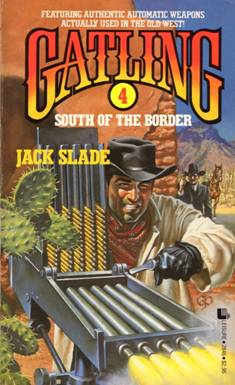
Original mass-market paperback books in its heyday is interesting. For the past two years, I have been learning some of that history belonging to a Men’s Paperback discussion group. Len Levison, Lou Cameron, Marvin Albert, Ralph Hayes, and Peter McCurtin are some of the writers from that period.
Peter McCurtin (1929-1997) was Irish born, transplanted to America where he was an editor at Tower-Leisure Book and writer. He wrote in crime, adventure, and western genres in the 1970s to early 1990s.
One series he wrote for Leisure Books in the late 1980s was “Gatling” under his “Jack Slade” pseudonym. Six Gatling books came out in 1989 to 1990. Gatling is McCurtin’s take on the late 19th Century American adventurer series. Ben Haas’ (writing as John Benteen) “Fargo” was the probably the first and still the greatest as he adventures in the early 20th Century in various places. Lou Cameron wrote the Captain Gringo series. The idea is having an American soldier of fortune using new weapons in rough areas. Bolt action rifles, smokeless powder, the first automatic pistols, machine guns are generally part of the mix. Read More
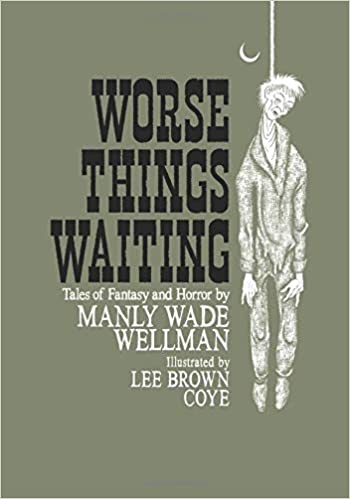 I’ve been a Manly Wade Wellman fan ever since listening to a Baen Podcast where David Drake discussed the life and works of his friend–and dropped the little-known bombshell that John the Balladeer stories were included in the ebook version of Mountain Magic. Ever since then, reading Manly Wade Wellman has seemed like being a part of a secret club. Wellman is highly regarded by those who have read his works–but finding them has been a challenge. Up until recently, most of Wellman’s stories have been locked up in expensive small-print-run collector’s hardcovers or scattered in public domain collections.
I’ve been a Manly Wade Wellman fan ever since listening to a Baen Podcast where David Drake discussed the life and works of his friend–and dropped the little-known bombshell that John the Balladeer stories were included in the ebook version of Mountain Magic. Ever since then, reading Manly Wade Wellman has seemed like being a part of a secret club. Wellman is highly regarded by those who have read his works–but finding them has been a challenge. Up until recently, most of Wellman’s stories have been locked up in expensive small-print-run collector’s hardcovers or scattered in public domain collections.
About a couple years ago, that began to change. Who Fears the Devil? was released as an independent ebook and several collections returned to print for the first time in years–and in more affordable paper than the hardcover collectors’ editions that still appear to this day. Wellman’s works appear these days in a number of small presses, however, so it is easy for the avid reader to miss the news of the return of a previously out-of-print favorite. Even I missed the 2020 return of Lonely Vigils, the collection of Judge Pursuivant and John Thunstone occult mysteries, until recently. Again, it seems like you have to know someone who knows of Manly Wade Wellman to find out where the good stuff is.
So, at the behest of a couple Twitter mutuals, here’s a list of what’s available at reader-friendly prices. This is not intended to be a comprehensive list, as not only have many of the collector’s editions gone out of print, the contents of a number of smaller public domain books can also be found in the larger collections.
Today, Manly Wade Wellman is best known for his stories of John the Balladeer, also known as Silver John after the silver strings on his guitar. These short stories are collected in Who Fears the Devil?, a classic of Appalachian fantasy. Unfortunately, the ebook edition of the last few years has gone out of print, so the best way to read of John the Balladeer is still the ebook version of Mountain Magic. Again, that’s the ebook version, as, due to a rights issue at the time with the Kuttner estate not allowing ebooks of his works, Baen substituted the John the Balladeer stories instead. Currently, there is no reader-friendly paperback in print at this time.
Shadowridge Press has returned to print two important collections once published by Carcosa. Worse Things Waiting is a collection of 28 stories and two poems taken from the pages of Weird Tales, Unknown, Strange Stories, and many other Golden Age pulps. Meanwhile, the launch of Lonely Vigils was overshadowed by, well, 2020 in all its madness. This collection features famous occult detectives from the Golden Age of the Pulps, Judge Pursuivant, Professor Enderby, and John Thunstone (of whom some of his adventures have been reviewed here and here), and is a must for fans of Seabury Quinn. Both collections are in paperback only.
Sword and sorcery imprint DMR Books has brought back two of Wellman’s later fantasies. Heroes of Atlantis & Lemuria collects for the first time the mythological tales of the heroic Kardios, a survivor–and self-professed cause–of Atlantis’s fall. As a bonus for pulp fans, Heroes pairs Wellman with a rare Leigh Brackett story. And just in the last few days, DMR Books has released Manly Wade Wellman’s final novel, Cahena, a historical tale of a legendary warrior queen and the one soldier who dared to love her. Both books are offered in digital and paperback formats.
A trio of lesser works round out this reader’s guide to buying Wellman’s stories. First, a pair of familiar faces in The Further Adventures of Sherlock Holmes: War of the Worlds and Captain Future: The Solar Invasion. And a rare publication of Wellman’s science fiction in West Point, 3000 A.D.. Check each link for the versions available.
With the recent burst of rereleases, I am hopeful that more Wellman works might be made available soon. But, with the also recent returns of Who Fears the Devil? and Hok the Mighty to out-of-print status, if Wellman’s strange tales and even weirder monsters interest you, don’t dally on the purchase.
(EDIT: D. M Ritzlin gives a reminder that the sixth Kardios story can be found in Renegade Swords alongside Robert E. Howard, Clark Ashton Smith, A. Merritt, and more.)
Keep an eye out this weekend, as I’ll be doubling up with a review of Brian Niemeier’s latest, Combat Frame XSeed: S.